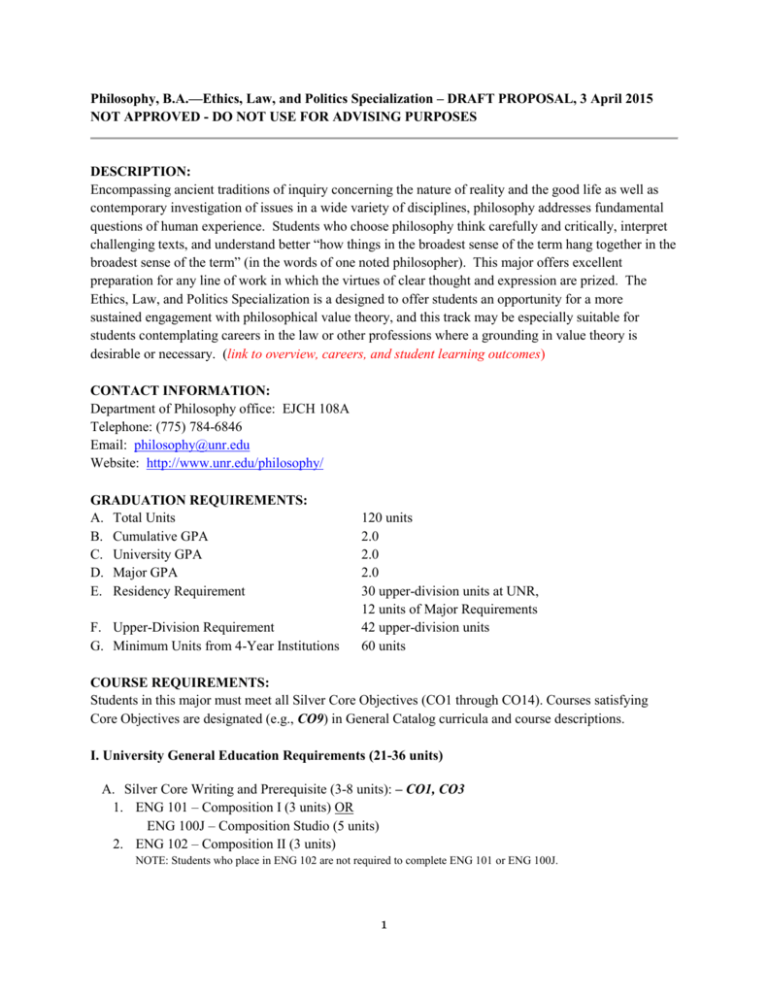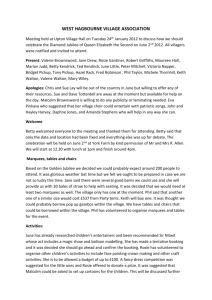Philosophy, BA—Ethics, Law, and Politics
advertisement

Philosophy, B.A.—Ethics, Law, and Politics Specialization – DRAFT PROPOSAL, 3 April 2015 NOT APPROVED - DO NOT USE FOR ADVISING PURPOSES DESCRIPTION: Encompassing ancient traditions of inquiry concerning the nature of reality and the good life as well as contemporary investigation of issues in a wide variety of disciplines, philosophy addresses fundamental questions of human experience. Students who choose philosophy think carefully and critically, interpret challenging texts, and understand better “how things in the broadest sense of the term hang together in the broadest sense of the term” (in the words of one noted philosopher). This major offers excellent preparation for any line of work in which the virtues of clear thought and expression are prized. The Ethics, Law, and Politics Specialization is a designed to offer students an opportunity for a more sustained engagement with philosophical value theory, and this track may be especially suitable for students contemplating careers in the law or other professions where a grounding in value theory is desirable or necessary. (link to overview, careers, and student learning outcomes) CONTACT INFORMATION: Department of Philosophy office: EJCH 108A Telephone: (775) 784-6846 Email: philosophy@unr.edu Website: http://www.unr.edu/philosophy/ GRADUATION REQUIREMENTS: A. Total Units B. Cumulative GPA C. University GPA D. Major GPA E. Residency Requirement F. Upper-Division Requirement G. Minimum Units from 4-Year Institutions 120 units 2.0 2.0 2.0 30 upper-division units at UNR, 12 units of Major Requirements 42 upper-division units 60 units COURSE REQUIREMENTS: Students in this major must meet all Silver Core Objectives (CO1 through CO14). Courses satisfying Core Objectives are designated (e.g., CO9) in General Catalog curricula and course descriptions. I. University General Education Requirements (21-36 units) A. Silver Core Writing and Prerequisite (3-8 units): – CO1, CO3 1. ENG 101 – Composition I (3 units) OR ENG 100J – Composition Studio (5 units) 2. ENG 102 – Composition II (3 units) NOTE: Students who place in ENG 102 are not required to complete ENG 101 or ENG 100J. 1 B. Silver Core Mathematics and Prerequisite (3-5 units) – CO2 Refer to the Core Curriculum chapter in this catalog. C. Silver Core Natural Sciences (6-8 units) – CO4 Refer to Core Curriculum chapter in this catalog. D. Silver Core Social Sciences (3 units) – CO6 Refer to the Core Curriculum chapter in this catalog. E. Silver Core Fine Arts (0-3 units) – CO7 The following units are recommended, and may be counted in major requirements: PHIL 202 – Introduction to the Philosophy of the Arts (3 units) Alternatively, refer to the Core Curriculum chapter in this catalog for other appropriate courses. F. Silver Core Humanities (6 units) – CO5 Select two: CH 201 – Ancient & Medieval World (3 units) CH 202 – The Modern World (3 units) CH 203 – The American Experience & Constitution (3 units) G. Silver Core Constitution (0-3 units) – CO8 The following units are recommended, and may be counted in major requirements: PHIL 207 – Introduction to Social and Political Philosophy (3 units) OR PHIL 453 – Topics in the Philosophy of Law (3 units) Alternatively, refer to the Core Curriculum chapter in this catalog for other appropriate courses. II. Additional Silver Core Requirements (3-18 units) Students must take courses that satisfy the following Core Objectives. Some or all of these requirements may be satisfied by courses in the major requirements. If courses shown below are not used to satisfy the additional Silver Core requirements, students must take appropriate courses in other departments. (Refer to the Core Curriculum chapter in this catalog for appropriate courses.) A. Science, Technology & Society Course – CO9 PHIL 244 – Bioethics (3 units) OR PHIL 480 – Science, Technology, and Society (3 units) B. Diversity & Equity Course – CO10 PHIL 210 – World Religions (3 units) OR PHIL 245 – Contemporary Moral Issues (3 units) C. Global Contexts Course – CO11 PHIL 210 – World Religions (3 units) OR PHIL 454 – Global Ethics and Justice (3 units) D. Ethics Course – CO12 2 PHIL 135 – Ethics (3 units) OR PHIL 244 – Bioethics (3 units) OR PHIL 245 – Contemporary Moral Issues (3 units) OR PHIL 450 – Ethical Theory (3 units) OR PHIL 452 – Aesthetics (3 units) OR PHIL 454 – Global Ethics and Justice (3 units) OR PHIL 457 – Political Philosophy (3 units) E. Capstone Integration & Synthesis Course – CO13 PHIL 476 – The Self: Philosophic and Psychoanalytic Explorations (3 units) OR PHIL 480 – Science, Technology, and Society (3 units) F. Application Course – CO14 PHIL 457 – Political Philosophy (3 units) III. Additional College Requirements (6-20 units) A. College Breadth Requirement (6 credits): Students seeking a Bachelor of Arts degree in the college shall be required to take, within the College of Liberal Arts, two courses that are outside the departments in which they major or minor, and that exclude courses taken to fulfill Core Curriculum requirements. B. Foreign Language (0-14 units): Successful completion of the foreign language requirement may be accomplished through one of five options: (1) complete a fourth-semester college course in a foreign language; (2) complete and transfer to UNR a fourth-semester course in American Sign Language; (3) demonstrate proficiency through placement examination or other means through the Department of Foreign Languages and Literatures; (4) show transcript evidence of successful completion of a fourth-year high school course in foreign language; or (5) participate in a studies abroad program preapproved by the college to meet the foreign language requirement. IV. Major Requirements (36 units) 1. Required Courses (15 units): A. Logic PHIL 114 – Introduction to Symbolic Logic (3 units) OR PHIL 326 – Symbolic Logic (3 units) B. General Historical Surveys PHIL 211 – Ancient Philosophy (3 units) AND PHIL 213 – Modern Philosophy (3 units) C. Ethical/Political Historical Surveys PHIL 317 – History of Ethical Theory (3 units) AND PHIL 318 – History of Political Philosophy (3 units) 3 2. Group Distribution Requirements (21 units): Group A—History of Philosophy Select one course: PHIL 314 – 20th C Continental European Phil (3 units) PHIL 315 – 20th C Anglo-American Phil (3 units) PHIL 403 – Early Modern Philosophy (3 units) PHIL 404 – 19th Century Philosophy (3 units) PHIL 406 – American Philosophy (3 units) PHIL 409 – Recent French Phil (3 units) PHIL 410 – Plato (3 units) PHIL 411 – Aristotle (3 units) PHIL 415 – Kant (3 units) Group B—Metaphysics and Epistemology Select one course: PHIL 131 – Introduction to Metaphysics (3 units) PHIL 224 – Introduction to Philosophy of Science (3 units) PHIL 425 – Philosophy of Language (3 units) PHIL 434 – Philosophy of Cognitive Science (3 units) PHIL 435 – Philosophy of Mind (3 units) PHIL 438 – Problems in the History and Philosophy of Science (3 units) PHIL 440 – Theory of Knowledge (3 units) PHIL 441 – Metaphysics (3 units) Group C—Ethics and Value Theory Select two courses from the following Core Group: PHIL 450 – Ethical Theory (3 units) PHIL 453 – Topics in Philosophy of Law (3 units) PHIL 454 – Global Ethics and Justice (3 units) PHIL 457 – Political Philosophy (3 units) Select three additional courses in Ethics and Value Theory (excluding any courses taken to satisfy the Core Group requirement): PHIL 135 – Introduction to Ethics (3 units) PHIL 203 – Introduction to Existentialism (3 units) PHIL 207 – Introduction to Social and Political Philosophy (3 units) PHIL 244 – Bioethics (3 units) PHIL 245 – Contemporary Moral Issues (3 units) PHIL 280 – Philosophy of the Body (3 units) PHIL 323 – Problems in Philosophy of Religion (3 units) PHIL 325 – Problems in Philosophy of History (3 units) PHIL 327 – History of Political Thought I (3 units) 4 PHIL 328 – History of Political Thought II (3 units) PHIL 450 – Ethical Theory (3 units) PHIL 451 – Happiness (3 units) PHIL 452 – Aesthetics (3 units) PHIL 453 – Topics in Philosophy of Law (3 units) PHIL 454 – Global Ethics and Justice (3 units) PHIL 457 – Political Philosophy (3 units) Note: With approval of your advisor, (a) other 400-level courses in philosophy whose topic in a particular semester focuses on ethics, law, or politics, or (b) other 400-level courses in other programs that satisfy Core Objective 12 or Core Objective 14 in the Silver Core Curriculum. Allowable courses from other programs cannot exceed 3 units in Group C. V. Minor Requirements (18-21 units) The Department of Philosophy accepts any minor approved by the College of Liberal Arts. VI. Electives (0-36 units) 5






